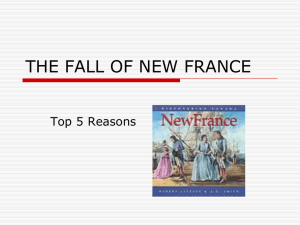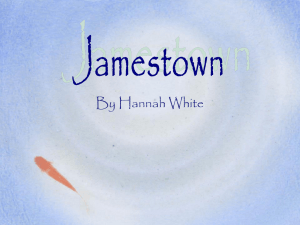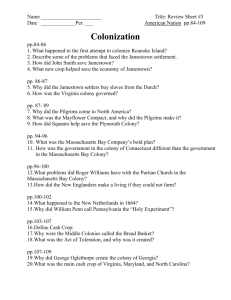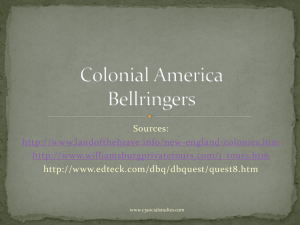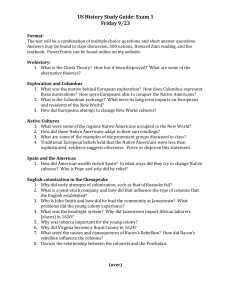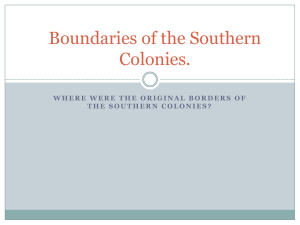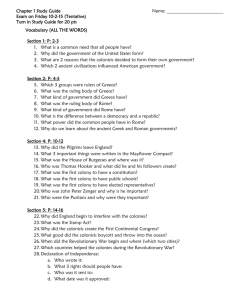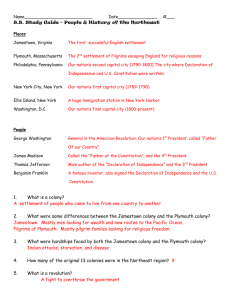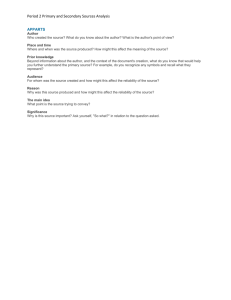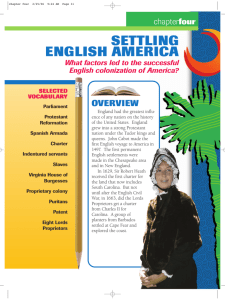vocabulary - Catawba County Schools
advertisement
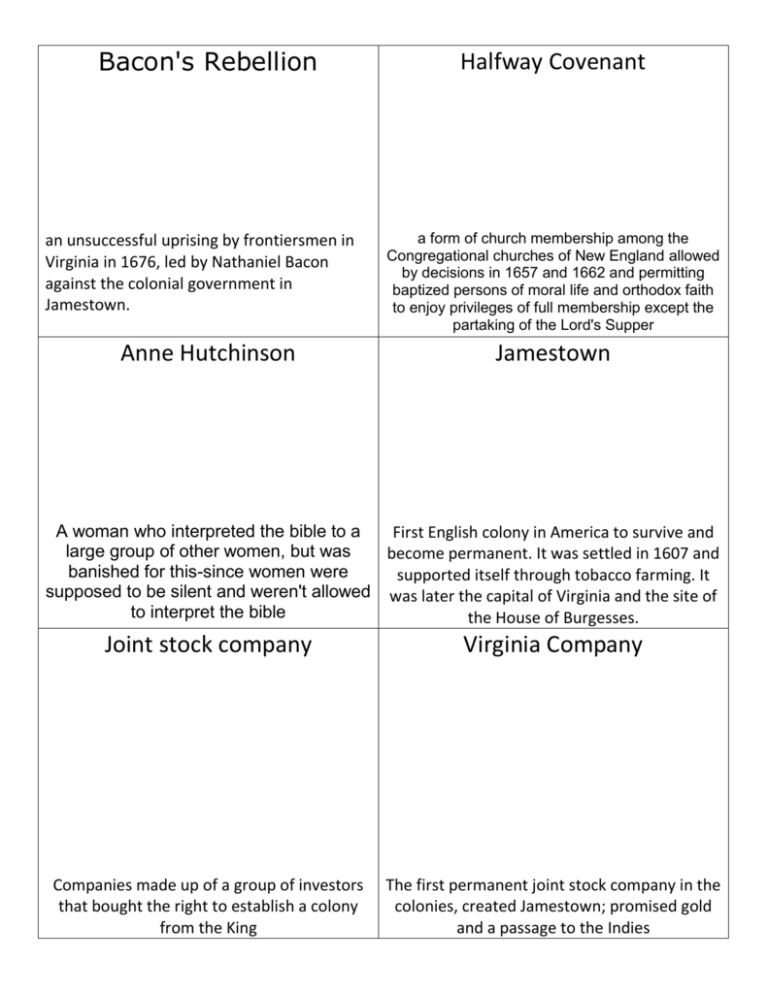
Bacon's Rebellion an unsuccessful uprising by frontiersmen in Virginia in 1676, led by Nathaniel Bacon against the colonial government in Jamestown. Anne Hutchinson Halfway Covenant a form of church membership among the Congregational churches of New England allowed by decisions in 1657 and 1662 and permitting baptized persons of moral life and orthodox faith to enjoy privileges of full membership except the partaking of the Lord's Supper Jamestown A woman who interpreted the bible to a First English colony in America to survive and large group of other women, but was become permanent. It was settled in 1607 and banished for this-since women were supported itself through tobacco farming. It supposed to be silent and weren't allowed was later the capital of Virginia and the site of to interpret the bible the House of Burgesses. Joint stock company Virginia Company Companies made up of a group of investors that bought the right to establish a colony from the King The first permanent joint stock company in the colonies, created Jamestown; promised gold and a passage to the Indies Captain John Smith John Rolfe Jamestown’s survivial was largely due to his leadership; he established harsh discipline and marshal law to ensure that those that did not work could not eat. He eased tensions between the colonists and the Indians when he married Pocahontas, Powhatan’s daughter. He also discovered a new strain of tobacco that helped the economy of the colony flourish royal colony: staple crop: A colony over which the king of England assumed control, granting it a royal charter in place of the charter it previously held. Not an act of tyranny, as often pictured, royalization guaranteed that England's laws (and English subjects' rights) would apply to colony and colonists slavery: A legal status in which an individual is owned by another individual who controls his or her actions and benefits from his or her labor. The status is for life (unless altered by the owner) and is inherited, The primary export (cash) crop of a region, the crop on which the region's economy rests. In the Chesapeake colonies, the staple was tobacco; farther south, it was rice or indigo. In later years, sugar (the staple in the Indies) was important in some areas on the mainland, but in time the classic staple--cotton--came to dominate the South's economy. indentured servant a poor person obligated to a fixed farm or unpaid labor, often in exchange for a benefit such as transportation, protection or training. (Especially common in early Virginia) headright system land grants to new settlers, encouraged family groups to migrate together, rewarded those who paid for passages of others middle passage that portion of a slave ship’s journey to which slaves were carried from Africa to the Americas Puritans Pilgrims (Separatists) Protestants who wished to purify the Anglican Church by breaking away from Catholic practices and barring people who were not committed Radical protestants who wished to break away from the Anglican Church entirely, they left England and eventually settled in the New World to escape persecution Mayflower Compact Covenant An agreement to establish a new government entered into by the Pilgrims in November 1620 Essentially an agreement in which people are united for a specific purpose. Rooted in Protestant theology, such agreements were the basis for church governments (especially among Calvinist congregations) and, in time, influenced civil governments as well (helped establish the idea of “consent of the governed”) Predestination the Calvinist doctrine that God has foreordained some people to be saved and some to be damned. Roger Williams heresy Departure from correct or officially defined belief. John Winthrop an English theologian who came to Plymouth Colony in the 1630's because he disagreed with the teachings of the Church of England. He quickly fell into disfavor over a few of his opinions, including: Plymouth settlers had no right to their land without paying Indians for it Plymouth Puritanism was too close to Anglicanism Church and state should be kept separate He was exiled from Plymouth and founded Providence (Rhode Island), King Phillip’s War Governor of Mass. Bay colony, he was instrumental in forming the colony’s government and shaping its legislative policy. He envisioned the colony as a “city upon a hill” Pequot War A conflict between an united Mass. Bay colony and Plymouth against the Pequot Indians A series of battles in New Hampshire between the colonists and the Wampanowogs because the Mass. Government tried to assert court jurisdiction over the Indians. The colonists won with the help of the Mohawks. Stono Rebellion A slave rebellion in South Carolina in September 1739. It was the largest slave uprising before the American Revolution Salem Witch Trials House of Burgesses The first representative assembly in the colonies. It was very much like the House of Commons in England Glorious Revolution Series of hearings before local the events of 1688–89 in England that resulted magistrates followed by county court trials in the ousting of James II and the to prosecute people accused of witchcraft establishment of William III and Mary II as joint in colonial Massachusetts between monarchs February 1692 and May 1693 proprietary colony: Maryland Act of Toleration A colony whose charter was granted by the king to an individual or a group Although the charter might place certain restrictions on the leaders, in general they were free to run the colony as they wished-appointing governors, establishing assemblies, dividing and granting land. Also known as The Act Concerning Religion. It was a law mandating religious tolerance for Christians. Enlightenment: The intellectual movement that dominated the late seventeenth and eighteenth centuries in Europe. Believing that the universe operated through natural laws that human beings, using their powers of reason, could understand Demographic concerning the general characteristics of a given population, including such factors as numbers, age, gender, birth and death rates, and so on Great Awakening Began in 1730s climax 1740s, new spirit of religious fervor, appealed to women and younger sons because of rhetoric of potential for every person to break away from constraints and renew relationship with God. Quaker English dissenters who broke away from the Church of England to preach a doctrine of pacificism, inner divinity and social equality. Under William Penn they founded Pennsylvania

